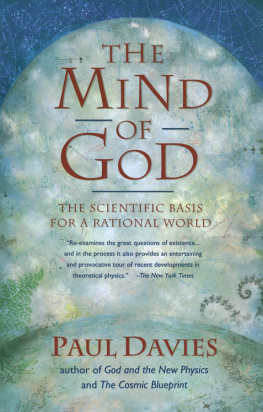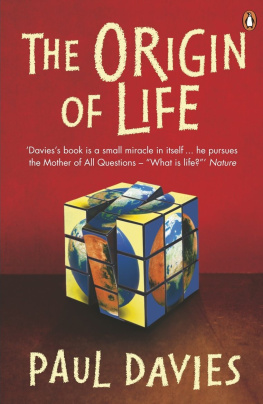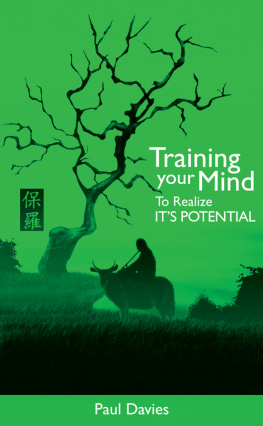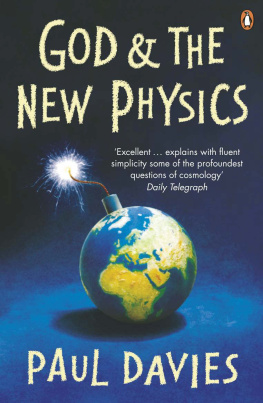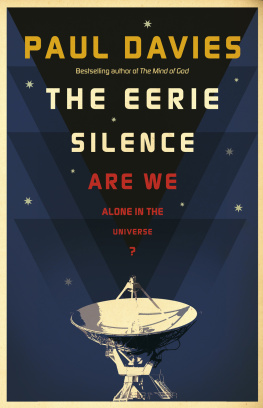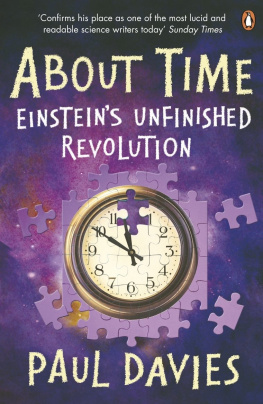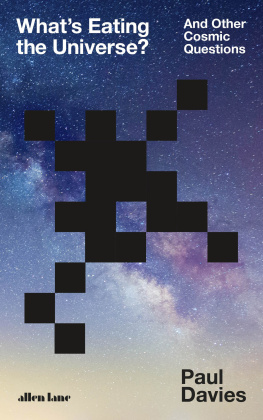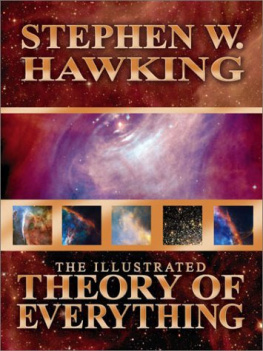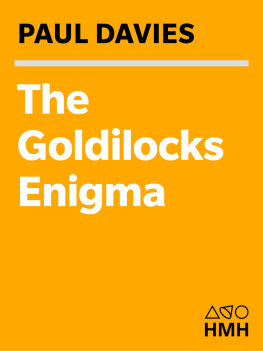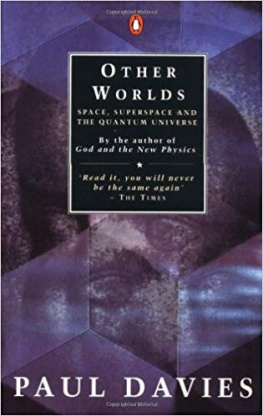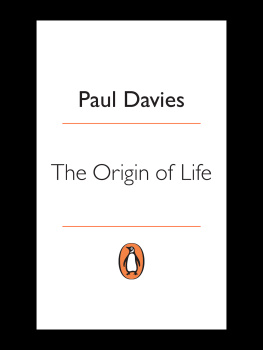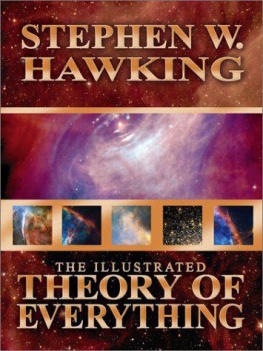The Mind of God
by Paul Davies
Also By Paul Davies
The Physics of Time Asymmetry
Space and Time in the Modern Universe
The Runaway Universe
The Forces of Nature
Other Worlds The Search for Gravity Waves
The Edge of Infinity The Accidental Universe
Quantum Fields in Curved Space (with N. D. Birrell)
God and the New Physics
Superforce
Quantum Mechanics
The Forces of Nature: Second Edition
The Ghost in the Atom (with]. R. Brown)
The Cosmic Blueprint
Fireball
Superstrings: A Theory of Everything? (with]. R. Brown)
The New Physics (editor) The Matter Myth (with ]. Gribbin)
The Scientific Basis for a Rational World
Paul Davies
KRESGE MEMORIAL LIBRARY
Covenant College Lookout Mountain, GA 30750-9601
Simon & Schuster New York London Toronto Sydney Tokyo Singapore

Simon & Schuster Simon & Schuster Building
Rockefeller Center 1230 Avenue of the Americas New York, New York 10020
Copyright 1992 by Orion Productions
All rights reserved including the right of reproduction
in whole or in part in any form. simon &. Schuster and colophon are registered
trademarks of Simon &. Schuster Inc.
Designed by Deirdre C. Amthor
Manufactured in the United States of America
3579 Library of Congress Cataloging-in-Publication Data
Davies, P. C. W.
The mind of God : the scientific basis for a rational world / Paul Davies
p. cm.
Includes bibliographical references and index. 1. Religion and science 1946- I. Title.
BL240.2.D29 1992
1c20 91-28606 CIP
ISBN: 0-671-68787-5
For Caroline, in recognition of your own search for truth
T
If we do discover a complete theory, it should in time be understandable in broad principle by everyone, not just a few scientists. Then we shall all, philosophers, scientists, and just ordinary people, be able to take part in the discussion of why it is that we and the universe exist. If we find the answer to that, it would be the ultimate triumph of human reason for then we would truly know the mind of God.
Stephen Hawking
Concluding sentence of A Brief History of Time
Contents
Preface
chapter 1 reason and belief
The Scientific Miracle
Human Reason and Common Sense
Thoughts About Thought
A Rational World
Metaphysics: Who Needs It?
Time and Eternity: The Fundamental Paradox of Existence
CHAPTER 2 CAN THE UNIVERSE CREATE ITSELF?
Was There a Creation Event? Creation from Nothing The Beginning of Time Cyclic World Revisited Continuous Creation Did God Cause the Big Bang? Creation without Creation Mother and Child Universes
Contents
\PTER 3 WHAT ARE THE LAWS OF NATURE?
The Origin of Law
The Cosmic Code
The Status of the Laws Today
What Does It Mean for Something to "Exist"?
In the Beginning
\PTER 4 MATHEMATICS AND REALITY
Magic Numbers Mechanizing Mathematics The Uncomputable Why Does Arithmetic Work? Russian Dolls and Artificial Life
UPTER 5 REAL WORLDS AND VIRTUAL WORLDS
Simulating Reality
Is the Universe a Computer?
The Unattainable
The Unknowable
The Cosmic Program
.PTER 6 THE MATHEMATICAL SECRET
Is Mathematics Already "Out There"?
The Cosmic Computer
Why Us?
Why Are the Laws of Nature Mathematical?
How Can We Know Something without Knowing Everything?
lPTER 7 WHY IS THE WORLD THE WAY IT IS?
An Intelligible Universe
A Unique Theory of Everything?
Contingent Order
The Best of All Possible Worlds?
Contents
Beauty as a Guide to Truth
Is God Necessary?
A Dipolar God and Wheeler s Cloud
Does God Have to Exist?
The Options
A God Who Plays Dice
CHAPTER 8 DESIGNER UNIVERSE
The Unity of the Universe
Life Is So Difficult
Has the Universe Been Designed by an Intelligent Creator?
The Ingenuity of Nature
A Place for Everything and Everything in Its Place
Is There Need for a Designer?
Multiple Realities
Cosmological Darwinism
CHAPTER 9 THE MYSTERY AT THE END OF THE UNIVERSE
Turtle Power
Mystical Knowledge
The Infinite
What Is Man?
Notes
Select Bibliography
Index
_
Preface
when i was a child I used to infuriate my parents by continually asking "why?" Why can't I go out to play? Because it might rain. Why might it rain? Because the weatherman has said so. Why has he said so? Because there are storms coming up from France. Why are there... ? And so on. These relentless interrogations normally ended with a desperate "Because God made it that way, and that's thatl" My child' hood discovery (deployed more out of boredom than philosophical acuteness) that the explanation of a fact or circumstance itself de' manded an explanation, and that this chain might continue indefi nitely, has troubled me ever since. Can the chain of explanation really stop somewhere, with God perhaps, or with some superlaw of nature? If so, how does this supreme explanation itself escape the need to be explained? In short, can "that" ever be "that"?
When I became a university student I reveled in the ability of science to provide such breathtaking answers to our questions about the world. The power of science to explain things is so dazzling I found it easy to believe that, given the resources, all the secrets of the universe might be revealed. Yet the "why, why, why... ?" worry returned. What lies at the bottom of this magnificent explanatory scheme? What holds it all up? Is there an ultimate level, and if so where did that come from? Could one be satisfied with a "that's-that" explanation?
In later years I began doing research on topics like the origin of the universe, the nature of time, and the unification of the laws of physics, and I found myself trespassing on territory that for centuries had been
Preface
jar-exclusive province of religion. Yet here was science either ling answers to what had been left as dark mysteries, or else r ering that the very concepts from which those mysteries drew >ower were actually meaningless or even wrong. My book God and was a first effort to grapple with this clash of ideologies. iind of God is a more considered attempt, ce publication of the first book, a lot of new ideas have emerged : forefront of fundamental physics: the superstring theory and approaches to so-called Theories of Everything, quantum cos- y as a means of explaining how the universe might appear from ig, Stephen Hawking's work on "imaginary time" and the cos- ;ical initial conditions, chaos theory and the concept of self- Lzing systems, and advances in the theory of computation and exity. In addition, there has been an enormous resurgence of st in what might be crudely described as the science-religion ice. This has taken two distinct forms. First, a greatly increased ue between scientists, philosophers, and theologians about the pt of creation and related issues. Second, a growing fashion for :al thinking and Eastern philosophy, which some commentators ;laimed makes deep and meaningful contact with fundamental :s.
Lould like to make my own position clear at the outset. As a sional scientist I am fully committed to the scientific method of igating the world. I believe that science is an immensely powerful lure for helping us to understand the complex universe in which e. History has shown that its successes are legion, and scarcely a masses without some new progress being made. The attraction of ientific method goes beyond its enormous power and scope, er. There is also its uncompromising honesty. Every new dis- i, every theory is required to pass rigorous tests of approval by the ific community before it is accepted. Of course, in practice, ists do not always follow the textbook strategies. Sometimes the ire muddled and ambiguous. Sometimes influential scientists 1 dubious theories long after they have been discredited. Occa-ly scientists cheat. But these are aberrations. Generally, science is in the direction of reliable knowledge, ve always wanted to believe that science can explain everything, >t in principle. Many nonscientists would deny such a claim tely. Most religions demand belief in at least some supernatural

